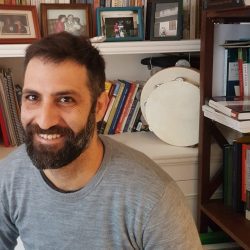Joseph John Viscomi, Lecturer, Birkbeck University of London (United Kingdom)
Project Title: Depopulating Landscapes: Environment and Community Archives in Calabria
Joseph’s research explores how depopulations has shaped historical connections between people and land. Joseph’s research explores this question by examining the emptying of towns and villages in Southern Italy. Stories about houses selling at reduced rates in emptied towns on Europe’s Mediterranean borderlands have become commonplace in popular media. These places are framed as ghost towns, potential tourist havens, or, less often, as locations that expose the dramatic material consequences of environmental change. In academic scholarship, the emptying of these towns is described frequently as an inevitable outcome of trajectories that trace back to early-modern urbanisation. The study of migration, for example, has long opted for an approach that follows migrants and the impacts of migration out of and away from places of departure. Few accounts –public and academic – consider locally grounded perspectives. Even fewer studies have considered the environmental contexts of, and changes stimulated by, protracted processes of departure, abandonment, and ruination. These depopulated towns have their own stories to tell, stories that suggest new perspectives on attachments between people and their material environments.
To explore these histories, this research focuses on relations between people and land in Calabria, one of Europe’s poorest regions. It considers how ‘natural’ events such as earthquakes, fires, floods, and landslides punctuate regimes of migration, land ownership, state bureaucracy, criminality and corruption, and political alliance. This project has several components. While its overarching interest is in the histories and futures of depopulation, it also acknowledges that limited archives (and, in some cases, populations) pose a challenge to research methodologies. It therefore moves in multiple directions at once by developing a strong community foundation upon which to explore and enhance historical knowledge and by contributing to historiographical, sociological, and environmental conversations on contemporary rurality.
This proposed research involves community partners at multiple levels in order to secure its long-term impacts. The main partner is Luisa Fabrizi of Borgo del Convento, a former Augustinian monastery in Petrizzi that the state expropriated after a devastating earthquake struck Calabria in 1783 and then privatised after the Napoleonic wars. From 1814 until the 1960s, it functioned as an estate-farm, which employed and housed many landless peasants. It was also the site of a small agricultural school. Fabrizi is an architect and artist; in addition to providing the location for the workshops, she and Joseph will collaborate in organising the workshop with primary and secondary school teachers and students, and the exhibition of the results of their research. Together, we will conduct oral-history interviews with former students of the agricultural school and with other agricultural workers who witnessed the period of mass depopulation after the Second World War. These interviews will become the basis for a collaboratively written and artistic output (oral history, photography, and sculpture) that explores the ways by which individual lives are enmeshed in the landscape.
At the base of this research is the belief that valid knowledge comes from a variety of sources. This project therefore aims to produce several diverse outputs, including the exhibition of the students’ work, but also a publicly accessible archive and multiple academic and non-academic publications. This project aims to create the following measurable impacts:
1-Establishment of new centers of knowledge (open libraries, museums, and public spaces for engaging in historical dialogue). CRISSA and the Biblioteca Calabrese provide models and an institutional umbrella in which small organizations can organize and envision similar centers for knowledge production and dissemination.
2- Creation of forums for combatting political corruption by empowering and strengthening civil society organizations. The creation of forums for debate and dialogue in the region outside of those sanctioned by municipal councils are few, a problem exacerbated by the pervasiveness of the ‘ndrangheta. This project will help to generate networks and establish new sites through which these conversations can take place.
3- Development of policies to invest in local communities. Existing academic scholarship on the region’s history has yet to be integrated with more contemporary socio-economic issues (post 1970s). In linking these historical processes, this project will help to articulate new policies and practices from the ground up in collaboration with non-profit organisations.
4-Application for larger-scale cultural and heritage schemes from EU and international organisations. Smaller cooperatives and organisations will be assisted in the preparation of applications for EU and international funding for local projects. ‘A Menzalora, one of the cooperatives with which we will work, for example, has recently acquired small amounts of funding to create workshops on weaving and textile production for their use of locally-grown ginestra (broom) on abandoned agricultural lands. Similar organisations have proven effective in shifting socio-political understandings of responsibility and value in struggles against political corruption and organised crime (Rakopoulos).
5-The project could be mirrored at Joseph’s home institution in several ways. Joseph has been working on establishing partnerships between cooperatives in Calabria, with the coordinators of London’s Spitalfields City Farm, a farm built on urban land occupied in the 1980s, and Birkbeck’s MA programmes in Cities and another in Food, Politics, and Society. Furthermore, in Joseph’s new role as director of the Raphael Samuel History Centre, a public history institution that seeks to connect academic debates to public concerns, he has begun discussions on how to network heritage and migration research in local communities with academic institutions and museums focused on environmental issues. In providing an international forum for these local organizations to share their knowledge, this could help to re-inscribe value in rural spaces.
